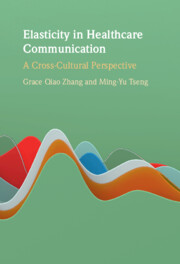Book contents
- Elasticity in Healthcare Communication
- Elasticity in Healthcare Communication
- Copyright page
- Contents
- Figures
- Tables
- Acknowledgements
- 1 Introduction
- 2 Theoretical Foundations
- 3 Methodology
- 4 Elastic Language Used in Chinese
- 5 Elastic Language Used in English
- 6 Comparison between Chinese and English Regarding Elastic Language Use
- 7 Perceptions of and Attitudes Towards the Use of Elastic Language in Chinese
- 8 Perceptions of and Attitudes towards the Use of Elastic Language in English
- 9 Comparison between Chinese and English Regarding Participants’ Feedback
- 10 General Discussion
- 11 Conclusions and Implications
- Book part
- References
- Author Index
- Subject Index
2 - Theoretical Foundations
Published online by Cambridge University Press: 04 August 2022
- Elasticity in Healthcare Communication
- Elasticity in Healthcare Communication
- Copyright page
- Contents
- Figures
- Tables
- Acknowledgements
- 1 Introduction
- 2 Theoretical Foundations
- 3 Methodology
- 4 Elastic Language Used in Chinese
- 5 Elastic Language Used in English
- 6 Comparison between Chinese and English Regarding Elastic Language Use
- 7 Perceptions of and Attitudes Towards the Use of Elastic Language in Chinese
- 8 Perceptions of and Attitudes towards the Use of Elastic Language in English
- 9 Comparison between Chinese and English Regarding Participants’ Feedback
- 10 General Discussion
- 11 Conclusions and Implications
- Book part
- References
- Author Index
- Subject Index
Summary
The four theoretical frameworks reviewed here are relevant to the conceptualisation of EL: pragmeme theory, integrative pragmatics, frame theory and elasticity theory. They are adopted as a guide through the research of EL in the present study. They all focus on pragmatic meanings grounded in context and complement each other for the benefit of this study. Pragmeme theory states that a pragmeme refers to a situation or an act that captures the goal of the situation, e.g., online healthcare information dissemination. This study expects that there should be regular patterns or protocols of EL use. The EL pragmeme can be realised in different situations, which can be manifested, according to the integrative pragmatics, through the pragmatic behaviours of online website writers and the evaluations of observers. The two focuses highlighted in integrative pragmatics are empirical evidence and the importance of observers’ participation (metapragmatics), both of which are adopted in this study. Frame theory guides the reader through the investigation of the participants’ perceptions of and attitudes towards the use of EL in this study.
Keywords
- Type
- Chapter
- Information
- Elasticity in Healthcare CommunicationA Cross-Cultural Perspective, pp. 7 - 31Publisher: Cambridge University PressPrint publication year: 2022



